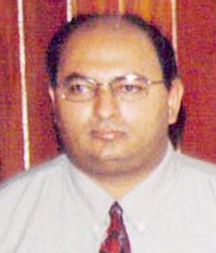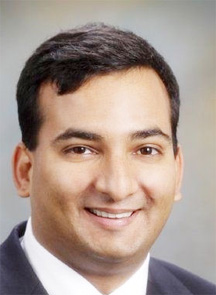NICIL Head Winston Brassington says a controversial share purchase by his brother saved Hand-in-Hand Trust from the fate of the collapsed Clico, however observers say the key question that HiH Trust and Brassington have to answer is how come his brother was the only investor who came to the rescue of the entity and whether this was a result of his receipt of privileged information.
Some observers are of the view that the actions of Winston Brassington in relation to the transaction are at the very least unethical even if not constituting a breach of any laws.
About whether his brother Jonathan Brassington benefited from insider information before investing in HIH Trust, Brassington responded that he did nothing illegal or unethical in this regard. He said that NICIL had ceased to be represented on HiH’s board from 2002 onwards and that he and his entity only had access to information which a normal shareholder would have access to – annual reports.

Further, he reiterated that he cleared his actions by writing to the Minister of Legal Affairs and Attorney General and to the Minister of Finance, and both of these officials had said they found no conflict of interest in Brassington’s brother taking up shares in the company.
Brassington is adamant that his brother’s investment in HiH Trust saved the entity from certain demise, unlike the fate of CLICO and Globe Trust. In addition, he said that HiH Trust had declared no dividends and that his brother had not made “a single cent” from the investment so far.
Speaking to the Stabroek News, Brassington said that any company under the Companies Act may from time to time increase its share capital. He said that once a company had majority control it could pass any resolution it wanted.

“We privatised the company in 2002 [with 90 per cent going to Hand in Hand and 10 per cent to government]. The Board of Directors is fully appointed by Hand in Hand. The only access that shareholders have after that are financial statements. And financial statements are public documents prepared under the Financial Institutions Act. So what the shareholders have available to them is what the public has available to them,” said Brassington.
Brassington said that neither Jonathan nor NICIL subscribed to the increase in the share capital of the company.
“The long and short of it is this. In 2008 when Hand in Hand took the Stanford hit, Mr Evelyn had a press conference indicating that they were exposed to $750 million. Any financially literate person would know that if this is your last balance sheet, you would not be able to comply with the regulatory requirements of capital adequacy,” he said; “therefore you must increase the capital.”
“It is public knowledge that HiH Trust was in serious trouble. They had to write off the Stanford investment. It would have wiped out their capital base,” Brassington said.
“There was no inside information. We don’t have a directorship on the board. We don’t see information. The financial institution’s business is confidential other than what is in the financial statements,” he continued, adding that NICIL had no veto power at HiH Trust.
While acknowledging that he was not aware whether an advertisement had been placed or not, Brassington said that in such situations it is not common to carry an advertisement and risk a run on the institution, where depositors withdraw all their money out of concern about what the company’s plight would mean for them.
Brassington said the increase in share capital occurred after his brother came in as an investor in HiH. “Jonathan’s investment saved HiH Trust from going down the road of Globe Trust or CLICO. By the way he only bought 30 per cent and HiH Trust still remained in control,” he said.
He went on to say that government shares in HiH Trust since the increase in share capital had been diluted to about 3 per cent and NICIL had not applied for more shares since then.
“NICIL has not had any directors since 10 years ago. This acquisition was seven years after the fact and three years ago. It came after a very publicly announced financial loss of HiH Trust which any reasonable person would know would impair its ability to comply with the Bank of Guyana’s minimum capital requirements,” he said. “Since privatisation, NICIL has had no influence and no ability to change any decision at HiH Trust,” he said.
“When this matter came up I wrote the Attorney General and the Minister of Finance notifying them of the [situation] and whether they saw any conflict of interest,” he told this newspaper, adding that the two officials said they had no reservations about the intended transaction.
Brassington said that the Bank of Guyana performed its due diligence on Jonathan Brassington, and after some months of this process, they approved the acquisition. Noting that the shares cannot be transferred without the clearance of the Bank of Guyana, he said the institution gave fit and proper approval to Jonathan Brassington’s ownership of the shares.
This newspaper made efforts to contact CEO of the Hand in Hand Group of Companies Keith Evelyn and General Manager and Director of HiH Trust Hewley Nelson, but those efforts were unsuccessful.
Observers say that while Winston Brassington was never on the board of HiH Trust, he acted as the representative of his brother while at the same time he was representing NICIL with regard to the government’s shareholding in the entity. They noted that because of this fact, Brassington would have been privy to information beyond that which would have been available to the general public.
Further, observers believe that HiH Trust issued shares beyond their authorised share capital and such an infraction is seen as being part of the transaction of the sale of shares to Jonathan Brassington.
In a Hand in Hand Trust resolution dated August 24, 2011, Winston Brassington signed on behalf of his brother Jonathan Brassington while Marcia Nadir Sharma, Brassington’s deputy at NICIL, signed on his behalf.
“There was nothing to suggest that he was acting under the authority of a power of attorney,” the observer said.
“The shares his brother took up are preferential shares not ordinary shares, as is the case of the shares government holds in the company. Therefore that is a clear conflict of interest. He supported the relegation of the priority rights, acting to the detriment of the government,” the observer said. However, Brassington said that they were common shares and not preferential shares.
In June 2009, Evelyn spoke of a plan to restore the capital adequacy of HiH Trust. At the time, he said that the plan would have taken between two weeks and three months to be approved by the Bank of Guyana. He said then that it was essentially a proposal which outlined how the company intended to increase its capital.
Around March of 2009 HiH Trust revealed that it had invested approximately $822 million (at an exchange rate of $203 to US $1) the year before in the Antigua-based Stanford International Bank.
That bank was one of several institutions which were forced to cease operations after the Stanford Financial Group headed by now jailed Allen Stanford came under scrutiny for running what was a suspected ponzi scheme.
There was an acknowledgement on the part of HiH Trust that the likelihood of retrieving the investment was dim and its loss would erode the entity’s capital base.
In December 2002, HiH acquired 90 per cent of the shareholding of Guyana National Cooperative Bank Trust (GNCBT) from the Government of Guyana. According to a note on its website, HiH viewed the acquisition of GNCBT as a key move in pursuance of its corporate objective of providing a total package of financial services.
“It saw the acquisition of the shares of GNCBT as the basis of synergy between this trust company and the other members of the Hand-in-Hand Group of companies,” HiH’s website said.
In 2004, GNCBT was renamed ‘The Hand-in-Hand Trust Corporation Inc and the company directed efforts towards retaining the existing goodwill of the GNCBT “while at the same time capitalizing on the strength of the Hand-in-Hand…”
The site said that the Hand-in-Hand Trust Corporation Inc was first established as a Department of the Guyana National Co-operative Bank and then was incorporated as the GNCB Trust Company Limited, a wholly owned subsidiary of the Bank with a share capital of $10,000 on December 29, 1971. This was increased to $100,000 on September 4, 1973. According to HiH, a decision was made in 1977 to have the GNCB Trust Company reconstituted as the GNCB Trust Corporation under Co-operative Finance Administration (COFA) in accordance with the GNCB Trust Corporation Act No 13 of 1977 whereby all the shares held by the GNCB were transferred and vested in COFA.
It states that by Order No. 26 of 1987 the authorized share capital was increased to $10,000,000, divided into 100,000 shares valued at $100 each and a decision was taken by the Board to have the sum of $6,500,000 of the reserves which amounted to $6,522,369 as at December 31, 1986 converted into 65,000 shares as at September 1, 1987. The issued shares of the corporation were 65,501 shares as at September 1, 1987.
Again by Order dated December 6, 1996 the authorized share capital was increased to $250,000,000 shares valued at $100 each which was accompanied by the capitalisation of reserves for the said share capital to be fully subscribed, the website states.
On December 5, 1998 by an Order the Minister of Finance deemed the Trust Corporation a Public Company Limited with effect from January 6, 1999. On November 10, 2002 the Trust Corporation was privatized resulting in the Hand-in-Hand Mutual Fire Insurance Company Limited acquiring 90 per cent of its shares. It said that subsequently HiH Fire sold some of its shares to Hand-in-Hand Mutual Life Insurance Company and Guyana Co-operative Insur-ance Service Ltd.




